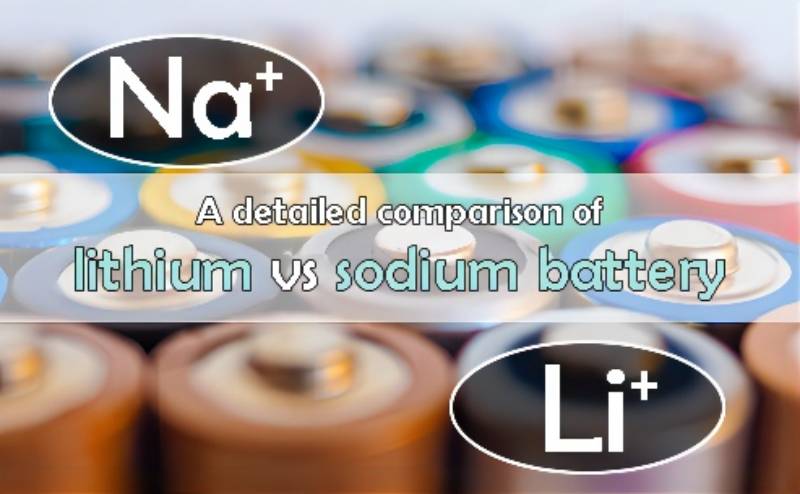
Main content:
- Introduction
- How lithium vs sodium battery work
- What is common between lithium and sodium battery
- What is the difference between lithium and sodium
- Advantages and disadvantages of lithium vs sodium battery
- Why are sodium batteries not used
- What is the most used battery in the world (application of lithium ion battery)
- Can sodium-ion batteries replace lithium-ion battery
- Conclusion
1. Introduction
The race for the battery of the future is gaining momentum. Every day, advancements in other batteries are trying to end the current dominance of lithium ion batteries for sale. An excellent example of these batteries is the sodium battery. Manufacturers and scientists in the battery sector are working day and night to improve on the shortfalls of sodium batteries to make them suitable alternatives to lithium batteries.
This article mainly introduces lithium vs sodium battery, it will explore the advantages of lithium over sodium batteries, and the gap that sodium battery manufacturers take advantage of to compete with lithium batteries.
2. How lithium vs sodium battery work
The mechanisms by which lithium vs sodium battery operate function the same way, albeit with different electrolytes and chemicals. They are also constructed the same.
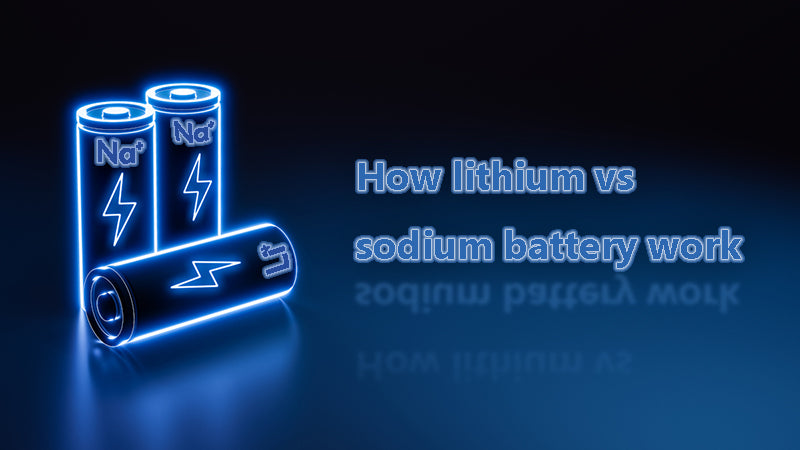
When lithium batteries are charged through the electrolyte, lithium ions move from cathode to anode.Thus, charge balance is achieved, and discharge is just the opposite. In comparison, sodium ions move from the sodium-iron cathode to the carbon anode during sodium batteries charging through a liquid electrolyte. Just like lithium batteries, the discharge process of sodium batteries is opposite to the charging process.
3. What is common between lithium vs sodium battery
Chemically, sodium and lithium metals are similar. Additionally, both batteries are constructed similarly, with the ion movement following a similar pattern during charging and discharge.
4. What is the difference between lithium and sodium
While a few tout sodium batteries as the future's battery due to the availability of sodium, they are no match for lithium-ion batteries, as you will see. The key differences between lithium and sodium:
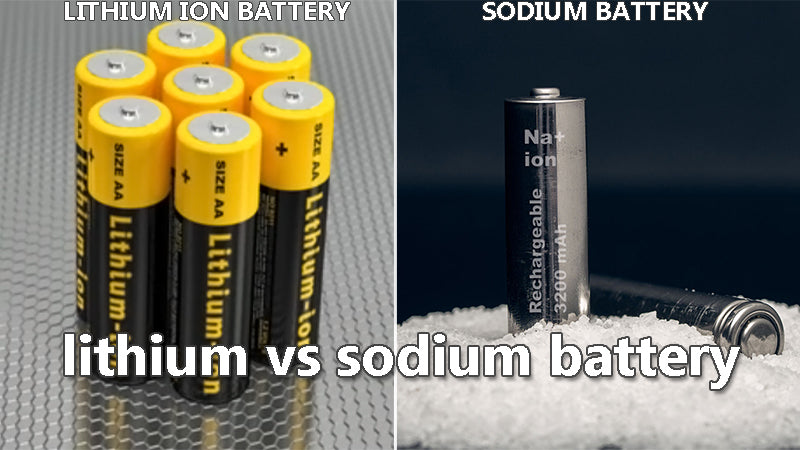
- Sodium heavier than lithium, thus making their batteries bulkier.
- Lithium has better electrochemical properties compared to sodium, thus making it more effective in energy transfer.
- Sodium batteries, unlike lithium batteries, do not suffer from the effects of extremely low temperatures.
- Energy density of lithium vs sodium battery is difference, lithium has a higher energy density than sodium. The energy density of sodium-ion batteries is 100 to 150 W h / kg, and the energy density of lithium iron phosphate battery is about 180Wh / kg, making lithium-ion batteries applicable for use in many fields.
- Sodium ions do not react with aluminum, so aluminum foil is used for all the cathode and anode fluid collections of sodium-ion batteries, but lithium reacts with aluminum, so the anode fluid collections of lithium-ion batteries use copper foil.
Comparing lithium vs sodium battery is simply not down to the availability of the resources. Other factors such as applicability, accessibility of the battery, and time spent on research must be considered. In this respect, lithium-ion batteries are better, which is something to consider when buying a battery.
5. Advantages and disadvantages of lithium vs sodium battery
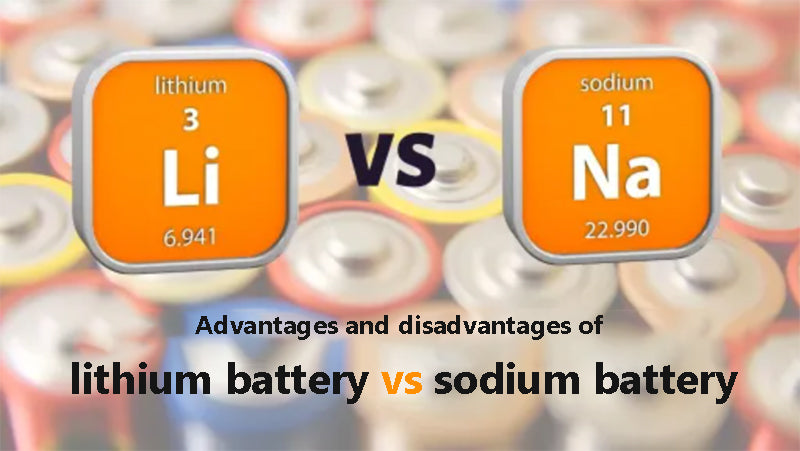
① Advantages of lithium-ion batteries
- They are lighter in weight.
- They are maintenance-free.
- They suffer from self-discharge rate is 3% per month.
- They have a high energy density, making them efficient performers with many life cycles.
- Lithium has a smaller ion radius, a higher standard potential, and a much higher specific capacity than sodium.
② Disadvantages of lithium-ion batteries
- Due to the cost and availability of Lithium, lithium-ion batteries are costlier than sodium batteries.
③ Advantages of sodium batteries
- Sodium-ion batteries are cheaper than lithium-ion batteries due to the ready-availability of sodium.
- Sodium batteries are easier to recycle.
- Sodium batteries can operate over a wider temperature range.
- Abound resources.
④ Disadvantages of sodium batteries
- Sodium-ion batteries have a low energy density.
- Due to the weight of sodium, sodium batteries are bulkier.
- Sodium-ion batteries with a 2000 cycle life and offer about three times less than lithium-ion batteries.
6. Why are sodium batteries not used
While sodium batteries have advantages that they can fill gaps to rival lithium batteries, they are still not as popular.
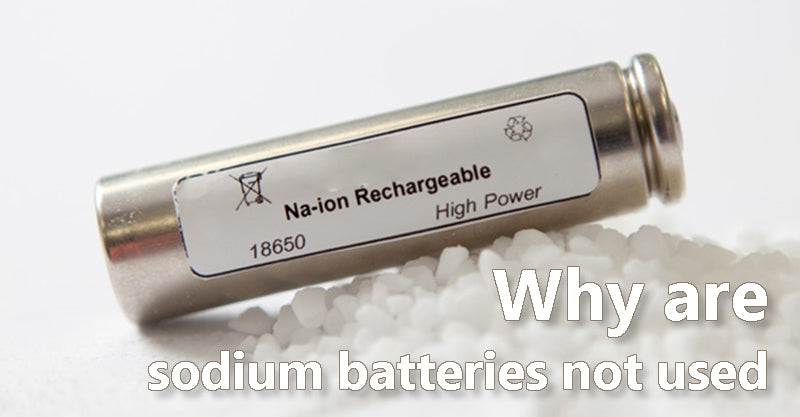
The main reason for this is that sodium batteries have a lower energy density compared to lithium-ion batteries. The size effect of Na + not only has a serious impact on the cathode materials, but also puts forward more stringent requirements for the embedding removal of Na + in the cathode materials. Na metals have much stronger chemical activity than Li and require very strict restrictions on the water and oxygen content in the experimental environment.
To far, efforts have been made to achieve crystalline phase stability by doping or selecting the most appropriate crystalline phase by fine-tuning the synthesis conditions, or to improve the conductivity through various strategies, such as carbon coating, reducing particle size, designing optimal shape, etc. Additionally, the bulky nature of sodium is a massive deterrent to its use. Especially when it comes to electric vehicles or handheld devices. Battery manufacturers are constantly looking at ways to reduce battery size and weight. Sodium's weight is a significant issue in this respect.
7. What is the most used battery in the world (application of lithium ion battery)
Lithium-ion batteries are the most popular batteries in the world for individual buyers, companies and governments for good reason. Because of their high energy density, li-ion batteries are more powerful, longer lasting and cost effective. According to a study carried out by the environmental and energy study institute in 2019, lithium-ion batteries are the most popular battery storage option, such as golf cart batteries, RV batteries and so on.
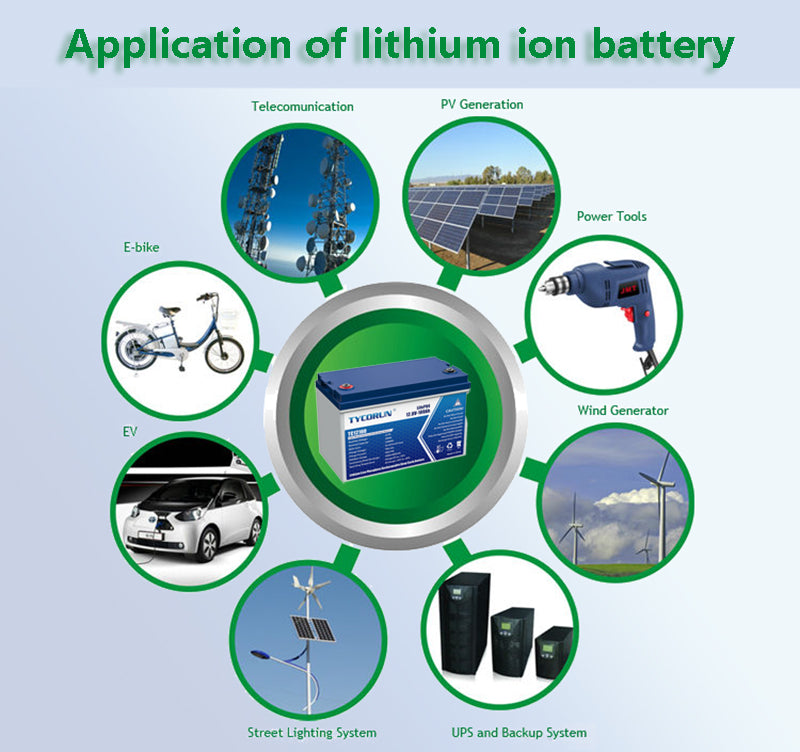
They also control a majority part of the global grid storage market at over 90%. With continued research on improving Li-ion batteries, this dominance is only expected to remain. Moreover, developing countries are using lithium batteries to increase the number of citizens connected to electricity. This is especially common in rural-electrification projects.
8. Can sodium-ion batteries replace lithium-ion battery
No, they can't. Often as a consumer, you are sometimes tempted to try different products.
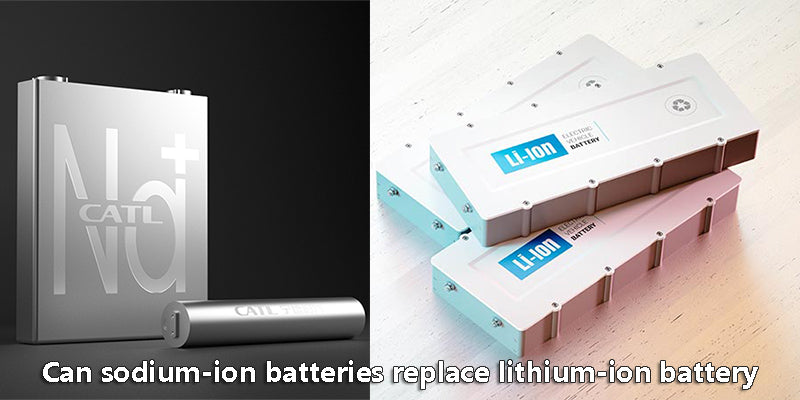
However, for batteries, tried and tested is best. And lithium-ion batteries are tried, tested, and considered the best. However, that should not take away from sodium batteries' various possibilities and advantages. Strictly from an environmental point of view in the lithium vs sodium battery debate, sodium batteries are superior as they are less toxic to the environment. Sodium is also readily available, unlike lithium which is scarce. Additionally, sodium batteries are cheaper than lithium-ion batteries. However, in the long run, li-ion batteries are more cost-effective due to their longer life span.
9. Conclusion
The lithium vs sodium battery comparison debate is ongoing, primarily due to carbon's negative effect on our environment. While multiple people push for adopting sodium batteries in everyday use, these batteries are simply not as effective and powerful as lithium-ion batteries. As a battery buyer, you not only want what will serve you, but you also want the best that is available. This is precisely what lithium ion batteries are the best. Contact a trusted battery manufacturer or retailer if you have any questions regarding these batteries.
Relater articles: lithium battery replacement, how do batteries work















